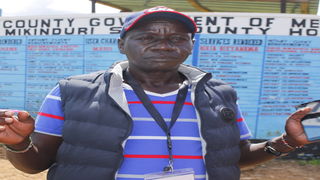
Mr Dominic Kaunyangi, a TB champion and survivor during the interview on May 18, 2021.
| David Muchui | Nation Media GroupMeru
Premium
Dominic Kaunyangi seeks to save Meru County from growing TB burden
What you need to know:
- Meru County is ranked third after Nairobi and Kiambu with the highest TB burden, recording over 3,600 cases in 2019.
- Kenya is ranked fourth after South Africa, Nigeria and Ethiopia among countries with high TB infections.
Mr Dominic Kaunyangi, a tuberculosis survivor from Mikinduri in Meru, traverses hilly villages every day on one mission: To help stop TB infections in the county.
As a TB treatment champion, Mr Kaunyangi has his work cut out for him – to engage TB patients and the community to ensure adherence to medication, observance of infection prevention measures and eradicate stigma, to delist Meru from the high TB burden counties.
According to the World Health Organisation (WHO), Kenya is among high TB burden countries in the world where about 140,000 Kenyans got infected in 2019 while 33,000 people died of the disease the same year.
Kenya is ranked fourth after South Africa, Nigeria and Ethiopia among countries with high TB infections.
Meru County is ranked third after Nairobi and Kiambu with the highest TB burden, recording over 3,600 cases in 2019.

Mr Dominic Kaunyangi, a TB champion and survivor talks to patients at Mikinduri Level 4 Hospital on May 18, 2021.
Mr Kaunyangi, a member of the Network of TB Champions, is not just a community health volunteer, but someone who contracted the disease and diligently took 15 tablets a day for one year and eight months.
Multi-drug resistant strain
As he walks into a patient’s home, he is focused on ensuring more people do not get infected with TB.
“Some two years ago, my brother got sick and was diagnosed with a multi-drug resistant strain of TB. I tried to convince him to get treated but he refused. I had to call in the public health officers who convinced him to take his drugs. Unfortunately, he had already infected me,” Mr Kaunyangi recounts.
After being diagnosed with the TB strain in 2019, he diligently adhered to his doctors’ instructions and on recovering late last year, he was keen on helping other patients in their treatment journey.
Besides accompanying patients to Mikinduri Level Four hospital every Tuesday, Mr Kaunyangi visits patients at home to ensure adherence and identify new infections.
“One of the reasons TB infections are high is stigma. Patients who are afraid of being stigmatised by friends and family fail to seek treatment or take drugs. They end up infecting others. As a TB survivor, I am able to convince patients to accept their condition and start the journey of healing,” Mr Kaunyangi says.
On arriving at the home of a patient, Mr Kaunyangi’s first task is to check the house for ventilation.
He carefully checks the windows, surveys the bedroom and other houses in the compound before giving a verdict.
“The first thing is to ensure the house is well ventilated to prevent the spread of the disease. I may advise the family to relocate the patient to a better house. TB patients are advised against sharing a bed as they may infect others,” he says.
The TB champion also ensures the patient has access to good nutrition and knows how to handle and dispose of their sputum.
“We encourage patients to take a lot of fruits and other nutritious foods. Sputum should be disposed of in a pit latrine because it is very infectious,” he adds.
At the hospital, Mr Kaunyangi ensures patients who weigh below 50 kilogrammes get food supplements from the hospital.
Mr Kaunyangi is among several Kenyans who recently joined the Network of TB Champions.
Network of TB Champions national coordinator Steve Anguva says they are keen on addressing the stigma and lack of awareness that is to blame for the high TB burden in the country.
TB survivors
According to Stop TB Partnership coordinator Evelyne Kibuchi, working with TB survivors is aimed at reducing the stigma that is associated with the disease.
“We want to use the champions’ experience with TB to fight the disease through advocacy and awareness. TB being a leading infectious killer in the world, there is a need for a unique approach to its eradication,” Ms Kibuchi says.
She says the situation was complicated by the outbreak of the Covid-19 pandemic where many patients with TB kept away from hospitals.
Ms Kibuchi is calling for the allocation of more resources towards the prevention and treatment of TB in the country.
The champions are also pushing the ministry of health to introduce an alternative diagnosis of TB -- such as using stool -- among children who cannot produce sputum.
“The government should also waive X-ray fees for children who account for up to 12 per cent of the TB burden. We also have a TB prevention therapy which needs to be subsidised to be more accessible,” Ms Kibuchi says.





